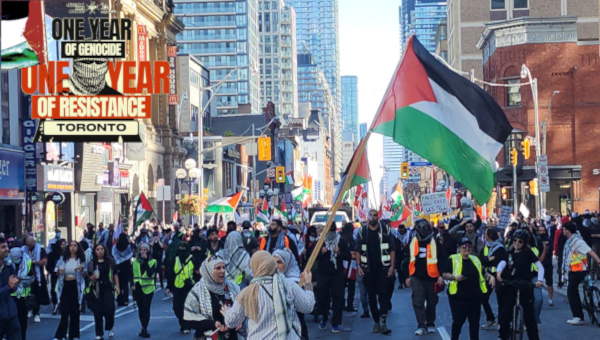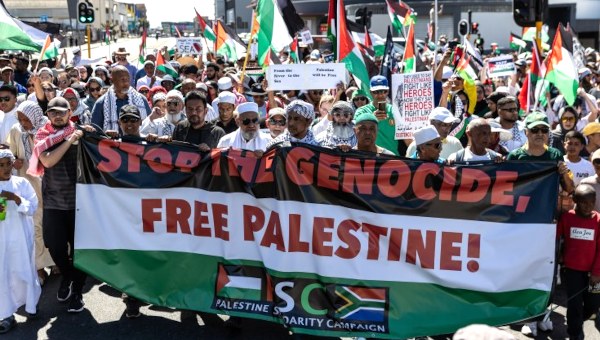Two-State Pipe Dream Impedes Justice, Again
Is Palestine enough of a state? This is what the International Criminal Court (ICC) must determine before it can consider charges of war crimes brought against Israel after its recent onslaught in Gaza. The scale of Israel’s 22-day military attack which claimed more than 1,300 lives, including hundreds of children, led to widespread accusations by international observers that Israel had committed war crimes. In February alone, the Chief Prosecutor of the ICC, Luis Moreno Ocampo, received over 200 appeals from Palestinian,
Israeli and international NGOs to investigate latest attacks in Gaza. The large number of Palestinian deaths, vast destruction of infrastructure and population centres, testimonies about indiscriminate attacks, and the use of experimental weapons created a humanitarian catastrophe which called into question the legality of the military operation. The ICC deliberations could potentially pave the way for putting IDF officers and military commanders involved in the operation in The Hague for crimes against humanity, setting an important legal precedent for the international court over the types of cases it addresses.
Israel is well aware of the legal challenges it faces. In addition to keeping its officers tightlipped about the details of the onslaught, the Israeli Defense Ministry issued new regulations strengthening censorship rules to prevent more detailed reporting and disclosing the identities of officers. Concerned about the flood of legal actions brought against military analysts and IDF officials, Foreign Minister Tzipi Livni summoned
an interministerial staff meeting immediately after the war with representatives from the justice, defense and interior ministry, and Israel’s national security council, the purpose of which was to strategize the legal safety of all participants in the execution of the war on Gaza.
In an article for the Israeli newspaper Ha’aretz, Yotam Feldman reports an unprecedented level of participation by Israeli experts in international humanitarian law during the Gaza onslaught. Legal participation in determining military targets was so extensive, that charges of the violation of humanitarian law and the perpetration of war crimes may also be extended to Israel’s legal advisers. Feldman outlines the willingness of the International Law Division in the Israeli Military’s Advocate General’s Office to “adopt the most flexible interpretations of the law in order to justify IDF operations.” Through the application of ambiguous terms such as “proportional equilibrium, legitimate military target, [and] illegal combatants,” Israel’s legal experts sought to veil the military attacks with an aura of legal and moral legitimacy. This played out against a background of previous declarations by military officials such as Gadi Eisenkot promising to “wield disproportionate power against every village from which shots are fired at Israel, and cause immense damage and destruction.” And so, when the tanks rolled out of Gaza, the battle changed from warfare to lawfare.
When petitioned by Palestinian human rights groups to formally investigate charges of war crimes, the ICC proved unable as it had no jurisdiction over Israel. And given that the courts have thus far not recognized Palestine as a sovereign member state, before the charges are even considered, the ICC has to delve into the issue of whether Palestine is “enough of a state” over which the courts have legal jurisdiction. Any acceptable move on the legal charges against Israel must first address the question of Palestine. The most unsettling realization is that regardless of the verdict of the ICC, Palestinian victims of Israeli war crimes will endure a significant political and legal blow.
Option 1 – Palestine is “enough of a state”
This verdict carries serious political ramifications. First, the Palestinian National Authority (PA) will be deemed the legitimate political representative in Gaza. The PA seeks to bring forth charges of war crimes against Israeli military officials on the grounds that it is the ‘de facto’ state authority in Gaza, and recognizes the court’s jurisdiction over the territory. To determine the case for Palestinian jurisdiction, the ICC is examining every international agreement signed by the Palestinian Authority to establish “whether it behaves – and is regarded by others – as operating like a state.”
The Palestinian Authority is a creature of the failed Oslo Accords. Formed in 1994 through a collaborative effort between the Palestine Liberation Organization (PLO) and the Israeli government, it was supposed to be an interim governing body through which final status negotiations between the two parties was to take place. This was never realized. In fact, while the PA was designed to control civilian and security related issues in parts of the Palestinian territories in the West Bank and Gaza Strip, its authority is constantly trumped by the Israeli military and political establishment through regular incursions, checkpoints and roadblocks, and the continued building of settlements.
This has considerable political implications. Recognizing the PA as the legitimate representative in Gaza supplants the authority of the Hamas government over the Strip. It furthers the international isolation campaign against the Hamas government in favor of the widely discredited PA, impeding movement toward a Palestinian unity government. Essentially, in granting the PA ‘state status’ the ICC bestows political legitimacy to a discredited governing body bypassing the democratically elected Hamas government.
Secondly, in arguing that the Palestinian Authority is the ‘de facto’ state in Gaza, Palestinian lawyers cite the claim that “Israel has no responsibility for Gaza under international law since its withdrawal in 2006.” The ICC verdict would give legitimacy to the dangerous notion that Israel is no longer an occupying power.
The primary components of the 2005 ‘disengagement’ plan were the dismantling of the settlements in Gaza, transfer of settlers to Israeli territory, and the withdrawal of all Israeli Occupation Forces from the Strip. Israel has since issued a military order declaring the end of the military government in, and formal occupation of, Gaza. According to B’Tselem, The Israeli Information Center for Human Rights in the Occupied Territories, since the withdrawal and the imposition of a siege, Israel continues to maintain complete control over Gaza’s air space, territorial waters, population registry, movement of people into and out of Gaza and the West Bank, imports and exports, and the taxation system.
The above activities are fully controlled by the Israeli government. Even in cases where they are partly relinquished to the PA, such as the population registry or the taxation system, they are not amended without the “prior approval of Israel.” This control is based on a military order deeming the Gaza Strip a “closed military area.” Indeed, the same characterization can be applied to the West Bank. The PA’s claim that Israel has no responsibility in Gaza since its withdrawal is a ridiculous (and dangerous) reading of the political situation. That said, relinquishing Israel of responsibility over the internal activities in Gaza since its withdrawal – particularly during the 22-day onslaught – is part and parcel of the PA’s case for Palestinian jurisdiction.
Finally, if the ICC declares that Palestine is “enough of a state” through the PA it will add fuel to the two-state pipe dream. The political answer to the Palestinian question is stalled because the majority of the world’s legal, political, and academic actors are stuck on the idea of a two-state solution. The prospects of this concept expired long ago and it is time we face the realization that if present political realities are any indication, a neatly divided “Israel” and “Palestine” will never be realized.
Lately, Israeli leaders have expressed a renewed desire to create a viable Palestinian state. Former Prime Minister Ehud Olmert announced that the “notion of Greater Israel no longer exists,” Kadima leader Tzipi Livni has long declared her intention to create a Palestinian state (if only to provide a national solution to Israel’s large Arab citizen population), and even Yisrael Beiteinu’s Avigdor Lieberman recently voiced his support for a Palestinian state if “all our conditions are met.” These political players have realized that ‘Greater Israel’ needs to be abandoned to ensure ‘Purer Israel.’ Indeed, when military occupation, mass slaughter and forced expulsion of the Palestinian population fails to guarantee Israeli territorial expansion, Israeli leaders appear to cling to the two-state solution as a last resort.
The reality is that the Israeli leadership is not committed to the two-state solution. Instead, Israel is examining alternative solutions to the two-state framework. Gaza will remain under siege. The Hamas government is bypassed on all levels and at all costs until Israel can ensure that a government conducive to its political interests assumes power in Gaza. As it stands, Fatah leader Mahmoud Abbas appears to be the most promising candidate for any future Gaza government.
In the West Bank, Israel has created institutional and infrastructural realities that prove the impossibility of two states for two peoples: territorial slivers set aside for Arabs in the form of Bantustans, such as Nablus, Ramallah, Hebron, Jenin, Qalqilia, Tulkarem, and Bethlehem, neighboured by Jewish-only settlements, partitioned by over 700km of a concrete Separation Wall, divided by an intricate set of settler-only bypass roads, and suffocated by checkpoints, flying checkpoints, roadblocks, and tunnel schemes. In addition, the Israeli NGO Peace Now recently unveiled the plans of Israel’s Housing Ministry for construction that would “nearly double the number of settlers,” and build “more than 73,300 new housing units in the West Bank.”
It is within this political and infrastructural mess which international observers are seeking to conjure up a Palestinian state. A wasted effort. The two-state solution Israeli policy and decision-makers have constructed is composed of an open air prison in Gaza, and a territorially sliced, militarily managed and politically suffocated West Bank.
The two state solution is an outdated concept. It fails to account for the political realities on both sides of the pre-1967 borders. For instance, the Arabs in Israel are left in the dark. Their unique situation as citizens of the state of Israel and members of the Palestinian nation is left unaddressed. They do not fit into the rubric of a “Jewish state” with legally enshrined forms of ethnic exclusivity, nor do they foresee social or political integration in a future “Palestinian state.” In response to their unique situation the organized sectors of this community of Palestinians within Israel issued 3 major documents in 2007 outlining their vision of an equal and bi-national Israeli state: the Haifa Declaration, the Democratic Constitution and the Future Vision. To address the needs of these ‘forgotten Palestinians’ inside Israel, the two-state solution much enforce a bi-national Israel – a thought which translates into an existential nightmare to the majority of the Israeli population.
Option 2 – Palestine is not “enough of a state”
The implications of this verdict are obvious: Israel walks away from another well-documented massacre. Charges around large numbers of civilian losses, targeting of hospitals, daycares, civil service buildings, academic institutions, international aid and relief centers, government offices, and densely populated neighborhoods are left unanswered. Palestine will remain a ‘non-state entity’ composed of a devastated and besieged Gaza and the multiple million-dollar Bantustan system Israel has actively established along the Jordan River since 1967.
Once again, the schizophrenia of the international legal and political system will surface: the law includes Palestinians within its jurisdiction only to declare that retribution for their suffering is not included within this jurisdiction. Further, Hamas is told it is not a viable political partner with the right to petition the ICC to investigate Israeli military attacks against its establishment. At the same time, Hamas is reprimanded to follow the laws of war and told not to attack civilian areas when resisting violent occupations.
To fulfill any claim to justice, a serious reconsideration of the prevailing political answer to the Palestine question must be conducted. The only way to move forward is to drop the two-state solution. The ICC’s consideration of widespread charges of Israeli war crimes must not give credibility to this outdated concept. The ICC’s adoption of the two-state framework creates a situation where both of the available options regarding the question of Palestinian statehood will have devastating political and legal implications, and neither will render justice.
The two-state solution is an unrealistic vision. It has never been realized in any capacity and does not reflect the political realities on the ground. It is a succession of images, emotions and thoughts passing through our minds when discussing the Israel/Palestine conflict, and merely delays justice to millions of Palestinians living under occupation, in dreadful refugee camps, as second class citizens, in exile, and in legal limbo around the world. When combined, these characteristics make up the definition of a dream. •





